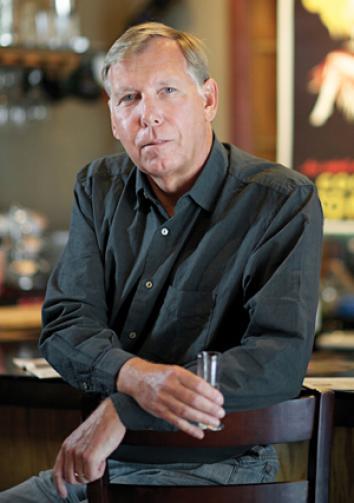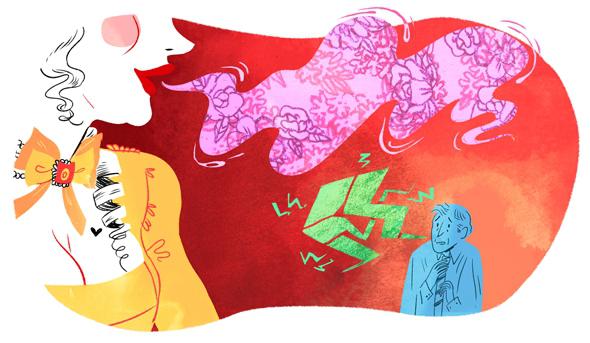What makes France and the French so intimidating? Here we Americans are, citizens of the world’s superpower, yet there’s probably no place that fascinates us more or puts us more off balance. Is it something in the French combination of discipline and seduction, organization and grace? Forming a bridge between Northern and Southern Europe, the French (or our stereotype of them, at least) have an unsettling competence for both work and play. Americans take comfort in being more fun than Germans and more organized than Italians, sure. But then, the French: women who know Proust and know how to dress, men who can talk geopolitics or seduce your wife. We Americans, in our uniforms of sneakers and baseball caps, visiting from our country with no history, can’t quite compete.
But we want to, oh how we want to communicate, to understand this culture, and to be accepted by it. For many of us, this starts with learning the language—usually with ridiculous results. I’ve been studying French for most of my adult life, and have lived in Paris for the last four years of it. Even with my hard-won proficiency, I experience those ridiculous results on a regular basis. The sad truth is that I will likely never be truly fluent. My daughter was born here and, at not yet 3 years old, she can untangle the confusing differences between masculine and feminine nouns better than I can. She starts at a Paris nursery school this week, and I’m dreading the day—not far off—when she begins correcting my French.
So why do adult language learners even bother trying, when faced with these seemingly insurmountable odds? This is the question William Alexander opens with in his perfectly pleasant and lightweight book Flirting With French. Fifty-seven years into a life spent revering the French, he sets out to finally learn the language. Is it possible for a man of his age to do this? Well, the first half of the book catalogs all the steps Alexander takes that are not actually taking a French class. Instead, there’s Rosetta Stone, a French pen pal, French in Action videos from the 1980s. He takes the reader on a trip to meet IBM’s universal translation program team and along on his seven-hour odyssey through Julia Child’s croissant recipe. These become—as he freely admits—avoidance techniques rather than aids in his quest for fluency. “It was, all in all,” he tells us, “far more entertaining and less stressful thinking about learning French than actually learning French.”
I spent a lot of Flirting With French arguing with Alexander—pleading with him to just sign up for a class, for God’s sake. It’s no surprise to me—nor, probably, to you—that he doesn’t achieve fluency, and makes his greatest strides during a two-week Provence immersion class in the book’s final chapters. Studying French stresses out Alexander so much that he blames the language for his persistent heart arrhythmia. It was hard for me to relate to this Woody Allen level of neurosis: palpitations because you can’t remember when to use vous and when to use tu?
But perhaps I’m being unfair. French is scary, in part because of our stereotype of French people as haughty and rude—as David Sedaris puts it, in American films, “when someone makes a spectacular ass of himself, it’s always in a French restaurant, never a Japanese or Italian one.” France also has, as Alexander reminds us, the venerable Académie française, an appointed body that has been meeting since the 17th century, whose purpose is to define and decide what exactly is and is not correct French. Most languages don’t have this kind of official governing body, and are free to grow dialects and adopt new slang without much fuss. However, in France there are official statements declaring common Anglicisms like le weekend and le shopping forbidden. It’s intimidating enough to cause occasional bouts of la panique.
French also lives up to its reputation as a language filled with sexual innuendo. If you plan to learn the language, just accept that you will be humiliated a few times by accidentally making a sexually suggestive remark when you’re just trying to, for instance, buy bread. Oh, I have so many examples to choose from in my own life, but here’s one: The word for line in French is queue, not unlike in British English. But instead of being pronounced like the final syllable in barbecue, it’s pronounced keuh—a little bit like a cough. For my first three years in France, I could never get this right—but cue (cul) is a slang term for ass. Yep, you make a lot of friends when you’re asking strangers “Is this the ass?”

Photo courtesy of J. Ferrara Photography
Or, take the case of Dr. Seuss. When I was pregnant during my first year in France, I was hunting for some classic children’s books in French. It made sense that the French wouldn’t be familiar with Dr. Seuss—translating Seuss’ bouncing rhymes into another language was surely no mean feat—but when I brought his name up, everyone gave me that quizzical, vaguely shocked look that told me I’d done something wrong. Uh-oh—what now? An American friend who is married to a Frenchman clued me in: Seuss, as we pronounce it in English, is the same as the French word suce, meaning to suck. But of course, because it’s French, it’s also slang for giving a blowjob. This is a language where America’s favorite children’s author translates as Dr. Blowjob—my friend’s husband went so far as to declare “No daughter of mine is reading something called Dr. Suce!”
So I do sympathize with the pitfalls and possible—no, make that definite—embarrassments of learning French. But at the same time, reading Alexander’s book felt a lot like hanging out with my father, someone whose attitudes toward France were shaped by the 1960s. Alexander expresses his love for France through references to Camus, Truffaut, and the hapless ordering of unknown organ meats during his youth. It’s all very France on $10 a Day, and while he does visit the France of 2014, it’s always with the intent of recapturing a part of this past—he and his wife, for example, spend their time in Brittany searching out a particular beach from an Eric Rohmer film. But I wonder if all these romantic ideas about France aren’t actually getting in his way. Learning grammar and the French subjunctive is far more tedious than sipping espresso and commenting on L’Etranger, but you can’t do the second one without going through the first one. I kept feeling that Alexander was holding French at arm’s length in order to protect his idea of it, as if doing the hard work of learning the language might shatter the perfect picture of the country he’d created.
Learning a language is a messy business: There’s no way to avoid mistakes, misunderstandings, and embarrassment. That’s because it isn’t only about learning the words. Part of learning a language is about learning the rituals of a culture, some of which are different than your own. Take bonjour. You can learn from your Rosetta Stone that it means “hello.” But in France, bonjour means much more than that. It’s a ritual of politeness that’s taken very seriously, the opening of any conversation with someone in an official capacity. In France, you don’t walk into Starbucks and order without looking at your barista—you look them in the eye and say “bonjour” first, a small acknowledgment of their humanity. If you forget to do this, as many Americans do, you may find yourself getting bonjour’d by a French person—they’ll say “bonjour” to you slightly forcefully, to remind you of the courtesy, like a person who’s held the door for you saying “You’re welcome” when you forget to thank him. It’s only one word, but it opens up a window to an entire cultural attitude different than your own—illuminating and irritating in equal measure. (Don’t believe me? Watch head of the IMF Christine Lagarde do it to Jon Stewart on The Daily Show.)
Cultures also reveal themselves through their untranslatables, the words we can’t move from one language to another. Alexander spends some time on one of my favorites, which he hears a lot as he tries to learn French: Bon courage. This means something between “good luck” and “you can do it”—or, occasionally, “whoa, I wouldn’t want to be in your shoes.” I hear it most often from French parents when my daughter is a meltdown on the street, often in French so advanced I can barely understand it. It’s an encouraging expression of solidarity, with a bit of ruefulness mixed in. Flirting With French reminded me that the goal of language learning shouldn’t be fluency, but understanding. To Alexander and all the second language learners out there, I say “Bon courage”—don’t be afraid to open your mouth and speak.
—
Flirting With French: How a Language Charmed Me, Seduced Me, and Nearly Broke My Heart by William Alexander. Algonquin Books.
See all the pieces in this month’s Slate Book Review.
Sign up for the Slate Book Review monthly newsletter.
